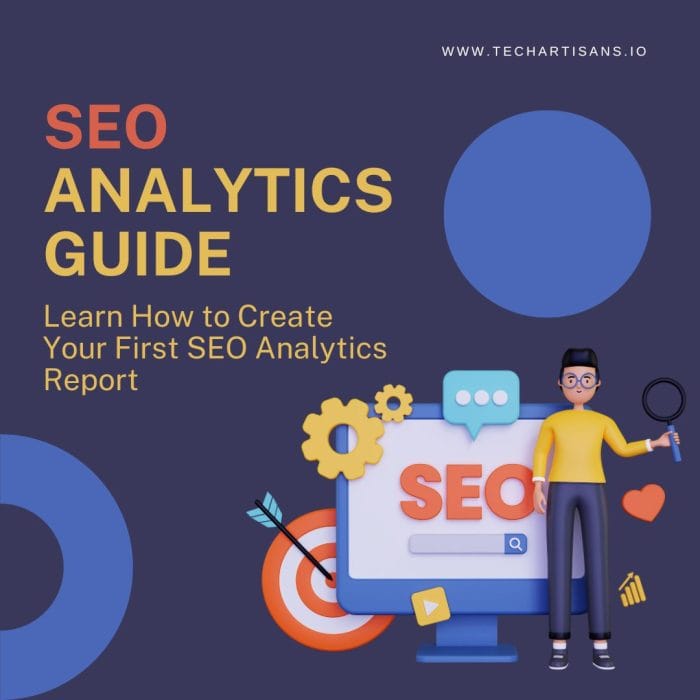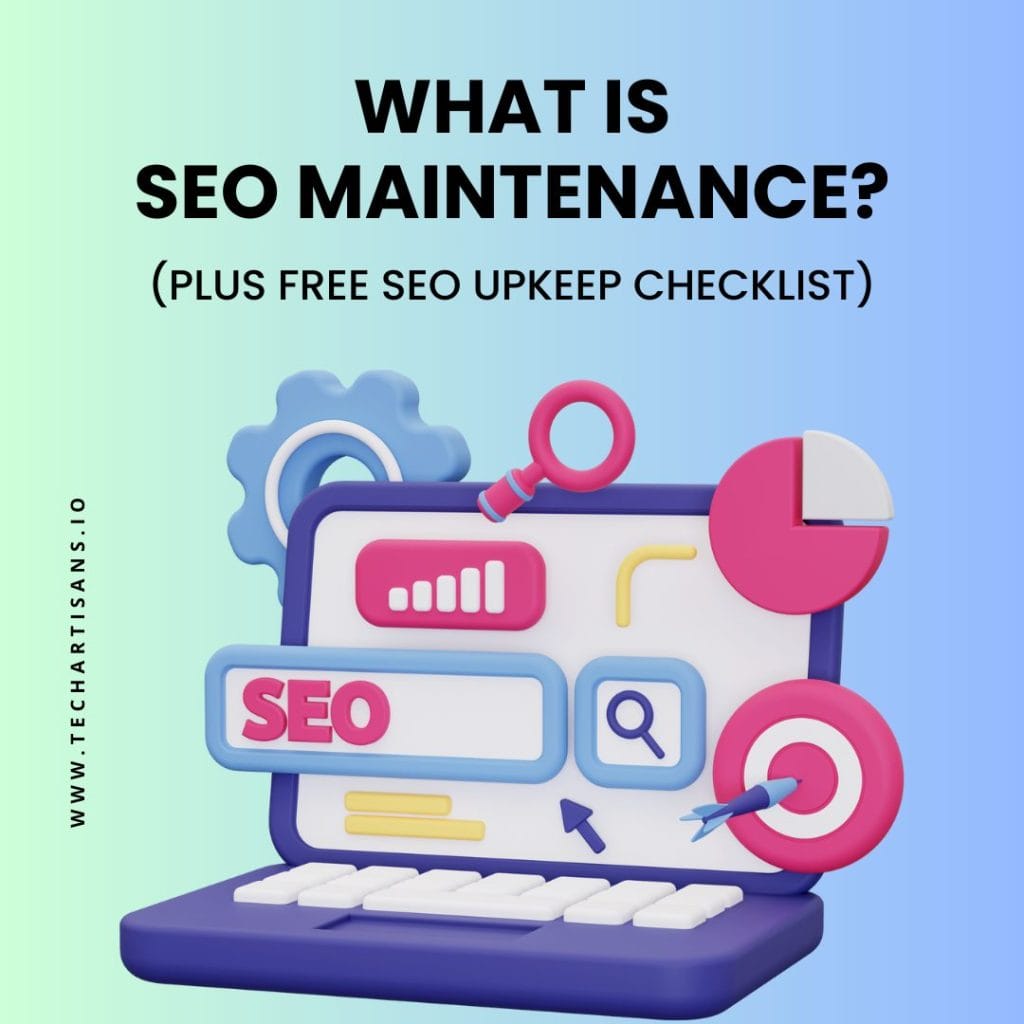Mastering SEO analytics has the power to revolutionize your business path. Our all-inclusive SEO Analytics Guide streamlines the creation of your first SEO analytics report, providing actionable insights specifically designed for small and medium-sized business owners. Embark on this transformative journey to unlock strategies that will elevate your online presence and drive business growth.
What is SEO Analytics?

SEO Analytics is a powerful toolset used to measure, collect, and analyze data for enhancing website visibility on search engines. It enables business owners to understand their website’s performance, identify opportunities for improvement, and make data-driven decisions to boost their site’s search engine ranking.
Definition and Significance

The term ‘SEO Analytics’ refers to the methods and tools used to analyze and interpret the performance of your website on search engines. It is significant as it aids in understanding the effectiveness of your SEO strategies, enabling you to optimize your website for higher visibility and increased traffic, thereby boosting your business’s online presence.
How It Impacts Business Growth and Online Visibility

SEO analytics plays a vital role in driving business growth and online visibility. It provides in-depth insights into website performance and user behavior, empowering businesses to fine-tune their SEO strategies. By doing so, they can improve their search engine rankings, attract larger organic traffic, and ultimately expand their operations.
Importance of SEO Reporting
SEO reporting holds paramount importance as it effectively communicates the success of your SEO efforts. It translates complex analytical data into understandable metrics, allowing you to make informed decisions and refine your SEO strategies for superior online visibility.
Read more about What is SEO Management and SEO Strategy
Demonstrating the Value of SEO Efforts

SEO efforts are valuable as they bring about improved website performance, higher search engine rankings, and increased organic traffic. By utilizing insights from SEO analytics, businesses can refine their strategies, resulting in a significant return on investment. In the end, these pursuits result in higher profits and greater brand exposure in the digital world.
Learn about What SEO Maintenance Plus SEO Checklist
Communicating Results to Stakeholders

Communicating SEO results to stakeholders is essential for maintaining transparency and trust. SEO reports provide concrete evidence of the effectiveness of your SEO strategies, showcasing increased web traffic, improved search engine rankings, and enhanced online visibility. This data-driven dialogue helps stakeholders understand the impact of SEO efforts on the business’s bottom line.
Find out SEO Acronym and How It Impacts on Business
Key Components of an Effective SEO Report

The key components of an effective SEO report provide a comprehensive overview of your website’s performance. They include metrics like organic traffic, keyword ranking, conversion rate, and backlinks, offering a clear snapshot of your SEO efforts’ success and areas for improvement.
Here’s Most Common Web Security Vulnerabilities
Executive Summary

The executive summary provides a concise overview of your website’s SEO performance. It highlights key metrics such as organic traffic, keyword rankings, conversion rates, and backlinks, outlining the effectiveness of your SEO strategies. This brief summary serves as a valuable tool for tracking your progress and identifying areas for improvement.
Key Performance Indicators

KPIs, or Key Performance Indicators, are crucial metrics that provide insights into your website’s SEO performance. Organic traffic, conversion rate, Click-Through-Rate (CTR), keyword ranking, backlink growth, and website health are among the primary KPIs. These indicators offer a comprehensive view of your site’s search engine visibility, user engagement, and overall digital health, helping you to fine-tune your SEO strategies effectively.
Read Mastering SEO: A Step-by-Step Guide and Plan
Opportunities

Opportunities are areas where your site can improve its SEO performance. These may include optimizing for new keywords, improving site load speed, or enhancing the user experience. By utilizing these valuable insights, you can actively tackle any gaps and position your business for enhanced online visibility and substantial growth.
Technical SEO

Technical SEO is a pivotal aspect of your website’s performance. It focuses on improving site speed, repairing broken links, reducing 404 errors, and enhancing crawl ability and indexability. By optimizing these elements, you can significantly boost your site’s SEO performance and user experience.
Content Marketing Analysis

An essential aspect of enhancing your SEO strategy is conducting a thorough Content Marketing Analysis. This process entails examining your most frequented landing pages to gain insights into what captivates and engages your audience. By analyzing keyword gaps, you can uncover untapped opportunities to create compelling content that drives increased traffic to your website.
Consider Free Content Writing Tools for Writing, Editing, Content Creation
Backlink Analysis

Backlink Analysis delves into the quantity and quality of both total and new backlinks, and referring domains, and identifies any lost backlinks or toxic links. This critical component provides a comprehensive view of your site’s trustworthiness and the effectiveness of your link-building efforts. It helps to pinpoint potential areas of optimization to enhance your site’s SEO performance.
Local SEO

Local SEO entails utilizing insights from Google Business Profiles, analyzing customer reviews, and efficiently managing listings. These actions are crucial in optimizing your business’s local presence and directing potential customers in your area toward your offerings. Skillful management of your online reputation and listings can have a substantial impact on your local search engine ranking and visibility.
Read more about Local SEO for Landscaping
Tools for SEO Analytics

There are several robust tools available for SEO analytics that can significantly enhance your ability to track, analyze, and improve your website’s SEO performance. These tools provide invaluable insights into your website’s visibility, user engagement, and overall digital health, allowing you to fine-tune your strategies effectively.
Google Search Console

Google Search Console is a free service offered by Google that helps you monitor, maintain, and troubleshoot your site’s presence in Google Search results. It offers tools to track search traffic and performance, fix issues, and make your site shine in Google Search results, thereby optimizing your SEO performance.
Google Analytics

Google Analytics is a powerful tool that helps you understand how users interact with your website. It provides insightful data about user behavior, site traffic, and conversion rates, thereby enabling you to gauge the effectiveness of your SEO strategies and refine them as needed. This data-driven approach guides your SEO efforts, directly contributing to improved website performance and user engagement.
SEMrush

SEMrush is a comprehensive SEO and digital marketing suite that provides a wide array of tools for keyword research, competitive analysis, and SEO optimization. It offers insightful data to help enhance your website’s SEO performance, making it an indispensable resource in any SEO Analytics Guide.
Moz

Moz is another key player in the SEO analytics space, offering robust tools like Keyword Explorer and Moz Local. The Keyword Explorer aids in finding high-value keywords and gaining insights into competition or SERP features.
Keyword.com

Keyword.com is an essential tool for tracking keyword rankings and measuring the share of voice. It provides detailed insights into your website’s position in search results for specific keywords. This tool helps optimize your SEO strategies by identifying successful keywords and highlighting areas for improvement, making it a crucial component in your SEO analytics arsenal.
SE Ranking

SE Ranking is an all-rounder SEO platform providing comprehensive solutions for on-page, off-page, and technical SEO. It offers tools for keyword rank tracking, competitive analysis, website audit, and backlink monitoring. The platform serves as an all-encompassing resource in your SEO Analytics Guide, ensuring optimized website performance and improved visibility.
Manual vs. Automated SEO Reporting

Manual and automated SEO reporting are two distinct approaches to gathering and analyzing SEO data. While manual reporting involves personally collating and interpreting data, automated reporting utilizes software tools to streamline these tasks, providing speedy and accurate insights for your SEO analytics.
Benefits and Drawbacks of Using Spreadsheets

Spreadsheets offer the benefits of flexibility and control, allowing you to customize your data analysis and reporting to meet specific needs. While spreadsheets are valuable, they require significant time and effort to maintain and can be susceptible to human error. Furthermore, they lack the benefits of real-time data and advanced analysis offered by automated SEO analytics tools.
Advantages of Automated SEO Reporting Tools

Automated SEO reporting tools like DashThis offer significant advantages such as real-time data tracking, advanced analysis, and data integration from multiple sources. They provide time-efficient, accurate reporting and minimize the risk of human error, enabling you to focus more on optimizing your SEO strategies based on precise data-driven insights.
How to Create Your First SEO Report

Creating your first SEO report is crucial for guiding your strategy. Set goals, choose relevant metrics, and use tools like Google Analytics, SEMrush, or Moz for data. Visualize with graphs, interpret findings, and share a concise report with stakeholders. Implement recommended changes and keep it updated. When sharing data, keep it simple, use visuals, focus on key points, and explain real-world impact.
Step-by-Step Guide

Here is a step-by-step guide to creating your first Seo Report.
Identify the most relevant metrics.

Depending on your specific goals, these may include organic traffic, bounce rate, conversion rate, etc. This should align with your overall business objectives.
Gather data through SEO analytics tools.

Use platforms like Google Analytics, SEMrush, or Moz to collect and interpret your data.
Visualize your data.

Use bar graphs, pie charts, or line graphs to represent trends and patterns in your data, making it more digestible and impactful.
Interpret and present your findings.

Analyze the visual data, infer the trends, and present the insights in a comprehensible manner that can guide strategic decisions.
Share the report with stakeholders.

Keep it simple, use visuals, and focus on key points that align with your business objectives. Explain real-world impacts and recommended changes.
Implement recommended changes and keep updating your report.
Continuously track and monitor data to assess the effectiveness of implemented changes, make necessary adjustments, and update your report accordingly.
Importance of Clear and Appealing Reports

The essence of creating concise, clear, and visually appealing reports is twofold. Firstly, it ensures efficient communication of findings, allowing stakeholders to quickly grasp key insights without wading through extraneous information. Secondly, visually appealing reports engage the audience, making complex data more tangible and easier to understand.
Digestible Data for Stakeholders

When presenting data to stakeholders, it is essential to use visuals like graphs, infographics, or tables to present key insights clearly and concisely. Focus on the most significant trends and impacts and explain their real-world implications. Choose a tone that aligns with your target audience’s level of understanding, using jargon only when necessary. Lastly, be open to questions and feedback and provide actionable recommendations based on the data presented.
Conclusion
SEO analytics and reporting serve as the backbone of any successful digital marketing strategy. They provide critical insights that guide your optimization efforts, enhance website performance, and boost visibility. The SEO Analytics Guide empowers you with the expertise and resources to tap into the potential of SEO analytics. Keep in mind, that the path to enhanced SEO performance starts with taking that first step, so don’t hesitate to put these strategies into action without delay.







